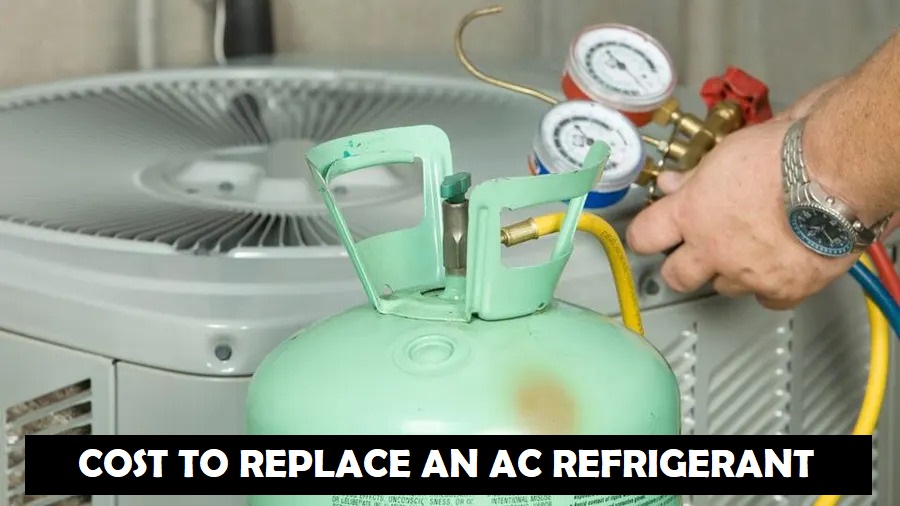Air conditioning is essential for maintaining a comfortable indoor environment, especially during the hot summer months. However, an AC system’s cooling ability depends on the refrigerant it uses. Over time, the refrigerant can leak or degrade, leading to decreased cooling performance and potential damage to the unit. In this article, we will explore the costs of replacing an AC refrigerant and other relevant factors to consider.

Understanding AC Refrigerant
AC refrigerant is a chemical compound responsible for absorbing heat from the indoor air and dissipating it outside. Commonly used refrigerants include R-22 (Freon) and R-410A (Puron). The refrigerant circulates through the AC system in a closed loop, transitioning between liquid and gas states to facilitate heat exchange.
Signs of AC Refrigerant Leak
Detecting a refrigerant leak early is crucial to preventing further damage to the AC system. Some common signs of a refrigerant leak include:
- Reduced Cooling Performance: If your AC is blowing warm or less cool air than usual, it may indicate a refrigerant leak.
- Hissing Sounds: Unusual hissing or bubbling noises coming from the AC unit can indicate a refrigerant leak.
- Frozen Coils: Refrigerant leaks can cause the evaporator coils to freeze due to insufficient heat absorption.
Importance of AC Refrigerant Replacement
When a refrigerant leak occurs, the AC system’s cooling efficiency drops significantly, leading to higher energy consumption and increased utility bills. Moreover, continued operation with low refrigerant levels can damage the compressor, resulting in costly repairs or even the need for a complete AC replacement.
Factors Affecting AC Refrigerant Replacement Cost
Several factors influence the cost of AC refrigerant replacement:
Type of Refrigerant
The type of refrigerant used in the AC system can significantly impact the replacement cost. Older refrigerants like R-22 are being phased out due to their harmful environmental effects, making them more expensive to procure. On the other hand, the more eco-friendly R-410A is becoming the standard, making it relatively more affordable.
Amount of Refrigerant Needed
The amount of refrigerant required for replacement depends on the AC system’s size and the extent of the leak. Larger systems with substantial leaks may require more refrigerant, increasing the overall cost.
Labor Costs
Labor charges vary based on the complexity of the job and the service provider’s pricing. Established HVAC companies might charge higher labor costs, but they often provide more reliable service.
Additional Repairs
Sometimes, refrigerant leaks may cause damage to other AC components, such as coils or valves. In such cases, additional repairs will add to the overall replacement cost.
Location and Service Provider
Geographical location plays a role in determining the cost, as service charges can vary from one area to another. Additionally, different service providers may offer different pricing, so it’s essential to obtain multiple quotes.
Average Cost of AC Refrigerant Replacement
On average, the cost of replacing AC refrigerant can range from $200 to $1,500, depending on the factors mentioned above. However, it’s crucial to get a professional assessment before proceeding with the replacement to get an accurate cost estimate.
DIY vs. Professional Replacement
While some DIY refrigerant recharge kits are available in the market, it’s important to note that handling refrigerants without proper knowledge and equipment can be hazardous. DIY attempts may lead to further damage and safety risks. Professional HVAC technicians are trained to handle refrigerants safely and accurately diagnose and repair leaks.
Preventive Measures for Refrigerant Leaks
To minimize the risk of refrigerant leaks and the need for replacement, consider the following preventive measures:
- Regular Maintenance: Schedule routine maintenance checks for your AC system to detect and address potential leaks early.
- Air Filter Replacement: Clean and replace air filters regularly to maintain proper airflow and prevent strain on the system.
- Avoiding Overuse: Avoid running the AC system constantly at very low temperatures, as it can put excessive strain on the unit.
AC refrigerant replacement is an essential part of AC system maintenance and ensures optimal cooling performance. The cost of replacement can vary depending on several factors, including the type of refrigerant, the amount needed, labor charges, and additional repairs. To avoid further damage, it’s best to seek professional HVAC assistance for refrigerant replacement.

